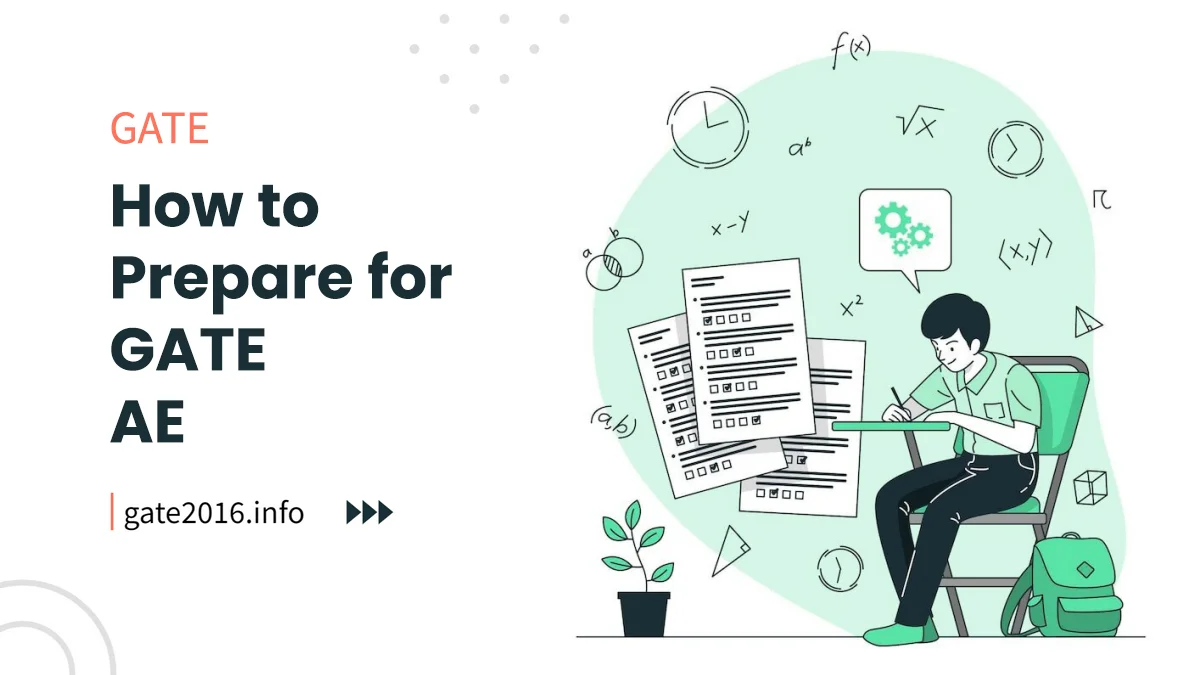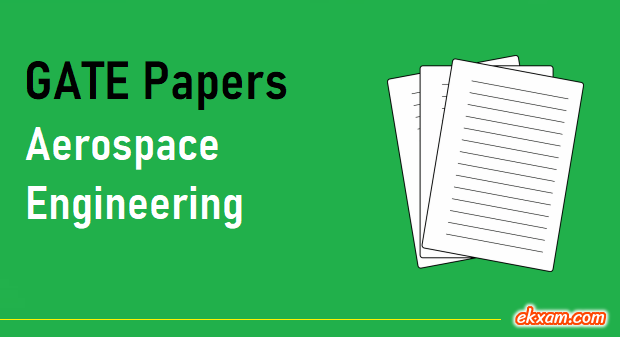Advertisements
Ratings

GATE 2024 AE Preparation – Preparing for the Graduate Aptitude Test in Engineering (GATE) in Aerospace Engineering requires a well-structured and strategic approach.
This comprehensive guide outlines a step-by-step plan to help aspiring candidates effectively prepare and succeed in the GATE Aerospace Engineering examination.
Contents
- 1. Introduction to GATE Aerospace Engineering
- 2. Understanding the GATE Aerospace Engineering Syllabus
- 3. Creating a Comprehensive Study Plan
- 4. Selecting the Right Study Resources
- 5. Mastering Fundamental Concepts
- 6. Enhancing Problem-Solving Skills
- 7. Solving Previous Years’ Question Papers
- 8. Simulating Exam Conditions with Mock Tests
- 9. Structured Revision Techniques
- 10. Staying Updated with Advancements
- 11. Managing Stress and Maintaining Positivity
- 12. Final Weeks’ Preparation Strategy
- 13. Approaching Exam Day with Confidence
- 14. Reflecting on the Exam and Planning Ahead
- Conclusion: Achieving GATE Aerospace Engineering Success
- Additional Resources and References
- GATE Aerospace Engineering Guidance
- GATE Aerospace Engineering Preparation FAQs
- GATE Total Information & Guidance
1. Introduction to GATE Aerospace Engineering
The GATE Aerospace Engineering examination serves as a pathway to prestigious academic institutions and lucrative career opportunities in the field.
To ensure success, it’s essential to adopt a systematic and comprehensive preparation strategy.
2. Understanding the GATE Aerospace Engineering Syllabus
The GATE Aerospace Engineering syllabus covers a diverse range of subjects crucial for a comprehensive understanding of aerospace engineering.
Here’s a detailed breakdown of the syllabus:
Table 1: GATE Aerospace Engineering Syllabus Breakdown
| Category | Subjects and Topics |
|---|---|
| Engineering Mathematics | Linear Algebra, Calculus, Differential Equations, Numerical Methods |
| Flight Mechanics | Basic concepts, Equations of motion, Atmosphere, Stability and Control |
| Aerodynamics | Basic fluid mechanics, Airfoils and wings, Compressible flows |
| Propulsion | Basics of propulsion, Jet propulsion, Rocket propulsion |
| Structures | Stress and strain, Beams, Columns, Buckling, Vibrations |
| Materials and Manufacturing | Mechanical properties, Heat treatment, Manufacturing processes |
| Aircraft Engineering | Airplane performance, Static stability, Aircraft structures |
3. Creating a Comprehensive Study Plan
Developing a well-structured study plan is fundamental to effective preparation for GATE Aerospace Engineering.
The following template can serve as a guideline:
Table 2: Sample Study Plan
| Week | Subjects/Topics | Time Allocation |
|---|---|---|
| 1-2 | Engineering Mathematics | 10 hours/week |
| 3-4 | Flight Mechanics | 15 hours/week |
| 5-6 | Aerodynamics | 12 hours/week |
| 7-8 | Propulsion | 10 hours/week |
| 9-10 | Structures | 15 hours/week |
| 11-12 | Materials and Manufacturing | 8 hours/week |
| 13-14 | Aircraft Engineering | 10 hours/week |
4. Selecting the Right Study Resources
Choosing the appropriate study materials is crucial for effective GATE Aerospace Engineering preparation.
Here are recommended resources for each subject:
Table 3: Recommended Study Resources
| Subject/Topic | Books | Online Courses |
|---|---|---|
| Engineering Mathematics | “Higher Engineering Mathematics” by B.S. Grewal | Khan Academy, Coursera’s Mathematics courses |
| Flight Mechanics | “Introduction to Flight” by John D. Anderson Jr. | NPTEL’s Flight Mechanics course |
| Aerodynamics | “Fundamentals of Aerodynamics” by John D. Anderson Jr. | Coursera’s Aerodynamics courses |
| Propulsion | “Elements of Gas Turbine Propulsion” by Jack D. Mattingly | NPTEL’s Propulsion course |
| Structures | “Mechanics of Aircraft Structures” by C.T. Sun | NPTEL’s Aircraft Structures course |
| Materials and Manufacturing | “Materials Science and Engineering” by William D. Callister | NPTEL’s Materials Science course |
| Aircraft Engineering | “Introduction to Flight” by John D. Anderson Jr. | NPTEL’s Aircraft Performance course |
5. Mastering Fundamental Concepts
Building a strong foundation in fundamental concepts is vital for GATE Aerospace Engineering preparation.
Focus on core subjects like Flight Mechanics, Aerodynamics, and Propulsion. Here’s a breakdown of essential topics:
Table 4: Mastering Fundamental Concepts
| Subject/Topic | Key Concepts |
|---|---|
| Flight Mechanics | Equations of motion, Atmosphere models, Stability and control |
| Aerodynamics | Airfoil characteristics, Lift and drag forces, Compressible flows |
| Propulsion | Thermodynamics of propulsion, Propulsive efficiency, Thrust equations |
6. Enhancing Problem-Solving Skills
Numerical problem-solving is a critical aspect of the GATE Aerospace Engineering exam.
Practice solving a variety of numerical problems to sharpen your calculation skills and familiarize yourself with question formats:
Table 5: Enhancing Problem-Solving Skills
| Concept/Topic | Problem-Solving Practice |
|---|---|
| Flight Mechanics | Solving equations of motion, Calculating forces and moments |
| Aerodynamics | Calculating lift and drag coefficients, Airfoil performance |
| Propulsion | Calculating thrust and specific impulse, Engine performance |
7. Solving Previous Years’ Question Papers
Solving previous years’ question papers and sample papers is invaluable for GATE Aerospace Engineering preparation.
It helps you understand the exam pattern, question formats, and difficulty levels:
Table 6: Benefits of Solving Previous Years’ Papers
| Benefit | Description |
|---|---|
| Understand Question Types | Identify common question patterns and types |
| Time Management | Practice completing the paper within time |
| Exam Pattern Familiarity | Get comfortable with GATE’s question format |
| Self-Assessment | Evaluate your preparation level and identify gaps |
8. Simulating Exam Conditions with Mock Tests
Taking full-length mock tests under timed conditions is crucial for exam readiness.
Mock tests replicate the actual exam environment, helping you manage time effectively and build confidence:
Table 7: Benefits of Taking Mock Tests
| Benefit | Description |
|---|---|
| Exam Simulation | Experience the actual exam environment |
| Time Management Improvement | Practice allocating time to different sections |
| Confidence Building | Boost your confidence before the actual exam |
| Identifying Weak Areas | Recognize areas needing further improvement |
9. Structured Revision Techniques
Regular revision is key to retaining the vast amount of information you’ll be studying.
Here’s how you can approach revision effectively:
- Develop a Revision Schedule: Allocate specific time for revisiting important topics and concepts.
- Create Concise Notes: Condense key information into concise notes or flashcards for quick review.
- Focus on Formulas: Regularly revisit important formulas and equations to keep them fresh in your memory.
10. Staying Updated with Advancements
The field of Aerospace Engineering is constantly evolving. Stay informed about recent developments and advancements:
- Follow Industry Publications: Subscribe to reputable aerospace engineering journals and magazines.
- Read Research Papers: Explore recent research papers and publications in the field.
- Engage with Online Communities: Participate in online forums and communities to discuss new trends and findings.
11. Managing Stress and Maintaining Positivity
Effective preparation requires a positive mindset and stress management techniques:
- Practice Mindfulness: Incorporate mindfulness meditation to reduce stress and anxiety.
- Balance Study and Breaks: Include short breaks and leisure activities to prevent burnout.
- Visualize Success: Imagine yourself succeeding in the exam to boost confidence.
12. Final Weeks’ Preparation Strategy
As the exam date approaches, focus on targeted revision and fine-tuning your skills:
- Intensive Revision: Allocate more time to subjects or topics where you feel less confident.
- Solve Practice Papers: Engage in additional practice by solving more question papers and mock tests.
- Avoid New Topics: Refrain from starting new topics; instead, consolidate what you’ve learned.
13. Approaching Exam Day with Confidence
On the exam day, stay calm and confident:
- Read Instructions: Carefully read and understand the question paper pattern and instructions.
- Manage Time Wisely: Allocate time to each section based on the number of questions and their complexity.
- Stay Composed: Stay composed and confident throughout the exam duration.
14. Reflecting on the Exam and Planning Ahead
After the exam, reflect on your performance objectively:
- Analyze Performance: Evaluate how you fared in different sections and subjects.
- Identify Weak Areas: Recognize subjects or topics that need further improvement.
- Plan Future Steps: Based on your performance, decide whether to pursue higher studies or explore career opportunities.
Conclusion: Achieving GATE Aerospace Engineering Success
Preparing for GATE Aerospace Engineering demands dedication, discipline, and strategic planning.
By following this comprehensive guide, you’ll be equipped with the knowledge, techniques, and strategies to excel in the exam.
Remember that consistent practice, a positive mindset, and a well-structured approach are the keys to success in the competitive GATE Aerospace Engineering examination.
Additional Resources and References
For more resources and references related to GATE Aerospace Engineering preparation, refer to the recommended books, online courses, and practice papers mentioned in this guide.
Staying connected with the evolving field of aerospace engineering through reputable sources is essential for continuous learning and staying up-to-date with advancements.
GATE Aerospace Engineering Guidance
- How to Prepare for GATE Aerospace Engineering: A Comprehensive Guide
- GATE 2025 Books: Aerospace Engineering
- GATE AE Syllabus 2025: Aerospace Engineering
- GATE AE Previous Year Solved Papers – (2023-2007)
GATE Aerospace Engineering Preparation FAQs
What is GATE Aerospace Engineering (AE)?
GATE AE is an examination conducted by the Indian Institute of Technology (IIT) for admission into postgraduate programs in Aerospace Engineering and related fields.
It assesses candidates' knowledge and understanding of aerospace concepts and serves as a gateway to higher education in this field.
What are the important subjects to focus on for GATE Aerospace Engineering preparation?
Key subjects to focus on include flight mechanics, aerodynamics, aircraft structures, propulsion, control systems, and aerospace materials.
It's essential to refer to the official GATE syllabus for Aerospace Engineering to ensure comprehensive coverage.
How should I prepare for the GATE AE exam?
Effective preparation involves creating a study plan based on the GATE syllabus. Use standard textbooks, reference materials, and online resources for each subject.
Solving previous years' question papers and mock tests is crucial for gaining familiarity with the exam pattern and refining your problem-solving skills.
Are there any recommended books or resources for GATE Aerospace Engineering preparation?
Yes, some recommended books and resources include:
- 'Introduction to Flight' by John D. Anderson
- 'Aircraft Structures' by David J. Peery and Azar
- 'Gas Turbine Theory' by Cohen, Rogers, and Saravanamuttoo
- 'Automatic Control Systems' by Benjamin C. Kuo
- Online courses and lecture videos from reputable institutions and platforms like NPTEL.
What is the exam pattern for GATE Aerospace Engineering, and how should I approach it?
GATE AE typically consists of multiple-choice questions, multiple-select questions, and numerical answer type questions.
Questions cover various aspects of aerospace engineering, including theory and practical applications.
Start by tackling questions you are confident about and manage your time effectively. Don't hesitate to skip challenging questions and return to them later.
Accuracy and a strong grasp of fundamental concepts are key to performing well in the exam.
Recent Posts
- AAI Through GATE 2024 – JE (Junior Executive)
- M Tech and MS Programs Through GATE and GRE: Navigating Postgraduate Options
- Job Opportunities After GATE 2024 in India: What You Didn’t Know!
- BSPHCL Through GATE 2024 – 40 AEE
Related Tags
How to prepare for gate aerospace engineering pdf 2024, How to prepare for gate aerospace engineering quora 2024, aerospace engineering gate syllabus pdf 2024, gate aerospace syllabus 2024, gate aerospace question paper 2024, gate aerospace coaching 2024, gate aerospace cutoff 2024, gate aerospace engineering eligibility 2024
| GATE (Reasoning & Aptitude & Maths) Books |
| GATE Guide Books |
GATE Total Information & Guidance
Click below given links to get further information.






